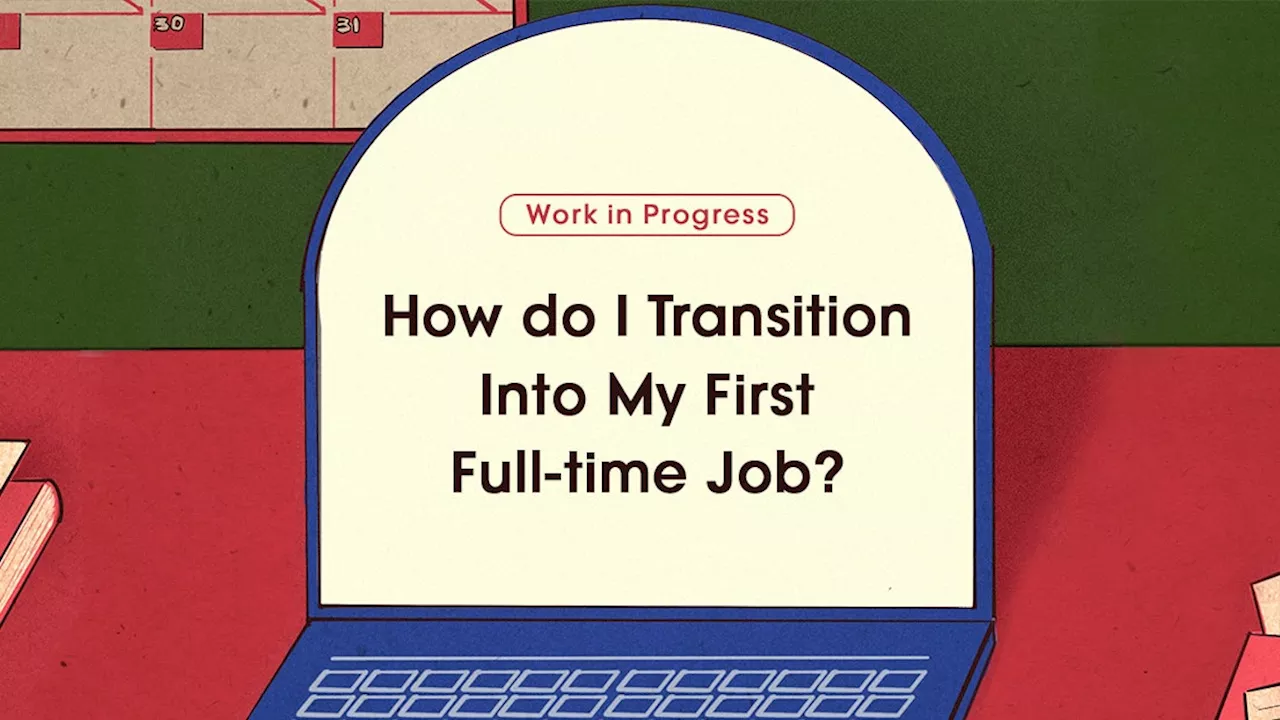This article provides guidance for young adults entering the workforce, covering topics like job searching, networking, adjusting to a new role, and managing expectations.
For those starting their jobs in young adulthood, the jump into full-time work might come with a mix of excitement, relief, and...total overwhelm. One reason the leap into a 9-to-5 can feel jarring is that it’s just one of many changes someone might be experiencing. With a new job comes new responsibilities and new routines and might also include a new way of moving through your life that impacts everything from friendships to free time.
\“There is so much that is happening that there is often not time to process all that is occurring in one's life,” Kalen Cobb, a staff therapist at The Family Institute at Northwestern University, tells Teen Vogue. Some clients come to her right after college, she says, and it’s the first time they’ve been able to take a breath. Before, they were working to get into college and then working to land a job. Not to mention young adults who have been supporting themselves, caretaking, or taking on responsibilities earlier in life. And that moment to catch your breath can feel short-lived with a job starting, new chapters of work and life beginning, and the hustle to pay bills happening at the same time. If you’re experiencing that, “Wait, we’re supposed to do this for the rest of our lives?” feeling, you aren’t alone. As you make the leap, we talked to experts about how to ease the shift when applying, starting a new job, and everything that comes after. \As you’re job-searching… Tabitha Barbour, a career coach at Butler University, tells Teen Vogue that she often meets with students who feel pressure to have a job lined up by graduation, or, on the other side of the spectrum, people who avoid conversations about what is happening after college altogether. But starting early gives you more time to think about what you want the next chapter to look like. Barbour encourages students to start networking well before they plan to apply. “We find that networking is the number-one way to find a job,” she says. “People want to work with people they know and trust, and the way to get to know people is through conversations.” Barbour tells students to take stock of who might be in their network: Did you meet someone through an internship or a part-time job? If you’re a student, can you connect with alumni from your school who have worked in the field you’re interested in? “I always tell the students I work with that working is good professional experience,” she says, including part-time jobs or those that are seemingly unrelated to the field you’re hoping to enter. Even if those connections don’t have a job offer for you, they could give you insight into a field or workplace that helps you make informed decisions. (You can also break the job hunt up into smaller pieces by reflecting on your skills and how you developed them, which can help guide you toward potential options.) When possible, Cobb suggests thinking about major life changes ahead of time: “I tell people, even if you have a week or two between graduation and a job, or a week or two before switching jobs, to really think about what is it that I need as a human to feel fulfilled, to feel good about myself?” Once you have the job… Once you’re in the role, there are ways to establish habits that make the transition easier. Lindsey Pollak, author of Getting From College to Career, often tells recent graduates to consider themselves like detectives in order to observe communication styles, workplace etiquette, and routines happening around them, which might vary from workplace to workplace. “The first step is to do your best to have a beginner's mind, meaning accept that this is new and different and you are learning a lot and will make mistakes,” she tells Teen Vogue. When you’re confused about something or need clarification, she suggests asking for advice from a person in your workplace who is closest to your level. That could also create opportunities to build rapport with coworkers and have open discussions about experiences in the workplace moving forward. With a new role can come pressure to wow a boss right out of the gate, but Pollak recommends a different approach: “It's better to focus on building a strong foundation by getting the basics right,” she says. Showing up on time, taking feedback on mistakes and applying it, taking notes on assignments, and paying attention are all solid basic starting points. This also allows you to settle in and grow with a strong foundation. Another factor to keep in mind is that your first full-time job isn’t necessarily the be-all and end-all. Because we spend so much time working, it makes sense that we’d want to enjoy what we do, but don’t panic if what’s paying your bills isn’t your passion. “Every professional experience is a chance to learn, grow, and build your experience, and professional relationships,” says Pollak. “It is very rare to know exactly what you want to do in life in your early 20s, and there is no such thing as a ‘perfect’ job or career path”,
Career Advice Young Adults Job Search Networking Workplace Transition First Job
United States Latest News, United States Headlines
Similar News:You can also read news stories similar to this one that we have collected from other news sources.
 Navigating the Return to Office: Tips for a Smooth TransitionThis article explores the challenges and opportunities associated with returning to the office full-time, offering expert advice on addressing concerns, maximizing productivity, and navigating the transition successfully.
Navigating the Return to Office: Tips for a Smooth TransitionThis article explores the challenges and opportunities associated with returning to the office full-time, offering expert advice on addressing concerns, maximizing productivity, and navigating the transition successfully.
Read more »
 National City leaders give themselves a 10% raiseThe full-time mayor and part-time council members voted 4-1 for the increase
National City leaders give themselves a 10% raiseThe full-time mayor and part-time council members voted 4-1 for the increase
Read more »
 Navigating the Return-to-Office Mandate: Protecting Your Time and CareerAs companies enforce return-to-office policies, explore strategies to protect your time, advocate for flexibility, and find opportunities that align with your needs. Learn how to navigate the RTO wave without sacrificing your career or well-being.
Navigating the Return-to-Office Mandate: Protecting Your Time and CareerAs companies enforce return-to-office policies, explore strategies to protect your time, advocate for flexibility, and find opportunities that align with your needs. Learn how to navigate the RTO wave without sacrificing your career or well-being.
Read more »
 Navigating Economic Uncertainty: Time in the Market vs. Market Timing StrategiesThis article explores the current market environment characterized by uncertainty and volatility. It delves into the factors driving inflation and their impact on the stock market, particularly the S&P 500. The author advocates for a balanced approach combining long-term investment strategies with strategic portfolio adjustments and risk mitigation techniques. He proposes an out-of-the-money S&P 500 put option spread as a potential insurance policy against significant market declines, emphasizing its ability to provide a favorable risk-reward ratio.
Navigating Economic Uncertainty: Time in the Market vs. Market Timing StrategiesThis article explores the current market environment characterized by uncertainty and volatility. It delves into the factors driving inflation and their impact on the stock market, particularly the S&P 500. The author advocates for a balanced approach combining long-term investment strategies with strategic portfolio adjustments and risk mitigation techniques. He proposes an out-of-the-money S&P 500 put option spread as a potential insurance policy against significant market declines, emphasizing its ability to provide a favorable risk-reward ratio.
Read more »
 Ohio Gov. DeWine Orders State Employees Back to Full-Time In-Office WorkOhio Governor Mike DeWine has mandated that all permanent state employees return to their offices for five-day workweeks starting March 17th. The order aims to improve public service and utilize office space efficiently.
Ohio Gov. DeWine Orders State Employees Back to Full-Time In-Office WorkOhio Governor Mike DeWine has mandated that all permanent state employees return to their offices for five-day workweeks starting March 17th. The order aims to improve public service and utilize office space efficiently.
Read more »
 California Senate Proposes Full-Time Firefighters to Combat Growing Wildfire ThreatSenate President Pro Tem Mike McGuire proposes a plan to transition California's seasonal firefighters to year-round employment, aiming to address the state's increasingly severe and year-round wildfire season. The proposal, estimated to cost at least $175 million, would allow for more prevention work and a consistent fire response throughout the year.
California Senate Proposes Full-Time Firefighters to Combat Growing Wildfire ThreatSenate President Pro Tem Mike McGuire proposes a plan to transition California's seasonal firefighters to year-round employment, aiming to address the state's increasingly severe and year-round wildfire season. The proposal, estimated to cost at least $175 million, would allow for more prevention work and a consistent fire response throughout the year.
Read more »
